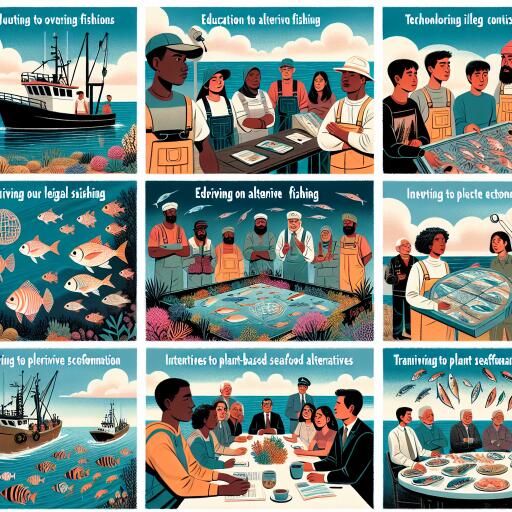
8 Ways That Stopping Overfishing Will Promote Biodiversity And Help Address Climate Change
In the face of a changing climate, conversations often revolve around reducing carbon emissions and transitioning to renewable energy sources. Yet, one crucial avenue for climate action frequently overlooked is the ocean. Specifically, halting overfishing emerges as a dual triumph for oceanic health and climate stability.
Through extensive research, it’s become clear that sustainable fishing practices are not only essential for the health of our oceans but also serve as a significant lever in the fight against climate change. Here are eight compelling reasons why ending overfishing is imperative for promoting biodiversity and addressing climate change.
1. A Climate Solution Hiding in Plain Sight
It’s not just about saving fish; ending overfishing represents a significant climate action. It boosts marine species’ resilience to climate change while simultaneously reducing carbon emissions linked to extensive fishing practices.
2. Protecting Small-scale Fisheries
Oversized fishing fleets, often supported by subsidies, pose a threat to smaller, local fisheries and exacerbate carbon emissions. Emphasizing sustainable practices can safeguard these communities, particularly aiding women who are disproportionately affected by these changes.
3. Learning from Success Stories
Examples like the recovery of European hake populations demonstrate the direct relationship between fish stock restoration and reduced emissions. These success stories offer valuable lessons in sustainable fisheries management.
4. Ecosystem-first Approach
Adopting ecosystem-based fisheries management prioritizes the health of marine ecosystems over exploitation of target species, fostering sustainable catch levels and enhancing the ocean’s carbon sequestration capabilities.
5. Combating Ocean Pollution
Heavy metal and pollution exacerbate the effects of overfishing and climate change, highlighting the need for comprehensive regulatory frameworks that address both ecosystem health and sustainability.
6. Addressing Compound Threats
Climate change and overfishing together lead to a cascade of ecological disruptions, from altered fish reproductive patterns to the spread of diseases and invasive species. A holistic approach is needed to mitigate these intertwined crises.
7. Global Cooperation for the High Seas
International agreements, such as the UN’s Biodiversity of Areas Beyond National Jurisdiction Treaty, are crucial for protecting ocean biodiversity and its climate change mitigation potential. Effective management and the establishment of marine protected areas are essential steps forward.
8. Seizing the Carbon Sequestration Potential of Oceans
Shifting focus from maximizing yields to enhancing the ocean’s carbon storage offers another avenue to achieve climate goals. Recognizing the multi-faceted role of marine life in carbon sequestration can inform future fisheries regulations.
The pressing need to halt overfishing goes beyond ecological conservation, acting as a critical component of global climate action. It’s a complex challenge that requires a multifaceted approach, including adopting ecosystem-based management, reducing pollution, and enhancing international cooperation for sustainable fisheries. As we move forward, it’s clear that the protection and management of our oceans are indispensable for a resilient and sustainable future.





Leave a Reply